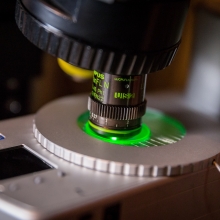Nature vs. nurture
First Zuckerman Scholar Dr. Ivo Spiegel is exploring the age-old question
New scientists

To what extent do experience and environment dictate brain function, and to what extent do our genes do so? It is a question many have been asking for decades. Dr. Ivo Spiegel, a new recruit to the Department of Neurobiology, is tackling this quandary in a highly creative way. His work has implications for a variety of disorders including autism, schizophrenia, and neurodegenerative disease.
The cortex, a brain area responsible for sensory processing and memory storage, is home to a diverse population of neurons, each with its own distinct function. Excitatory neurons receive electric input and generate a stimulating output for connected neurons. Inhibitory neurons do the exact opposite: They transmit to their connected neurons a signal that is inhibitory as it opposes the currents coming from the excitatory neurons. Thus, whether a given neuron will or will not send an electric signal to the next neuron is determined by the amount of excitation and inhibition that it receives.
The tight control over this balance between the amounts of excitation and inhibition (E/I balance) in the face of changing sensory experiences is critically important for normal brain function. It is achieved by regulating the synapses—the sites through which neurons connect to each other. Genetic mutations that affect synapses and lead to changes in E/I balance were recently linked to psychiatric disorders such as autism and schizophrenia.
Dr. Spiegel’s work focuses on E/I balance. He is making key inroads into understanding how this dynamic is affected by both genes and environmental factors, while revealing new data about the impact E/I balance has on brain function in both health and disease.
He received his BSc in biology with honors from Tel Aviv University, and then moved to the Weizmann Institute, where he received his MSc in 2001 and his PhD in 2007.
During his postdoctoral training at Harvard Medical School, he began to explore the molecular components underlying this delicate balancing mechanism and its effect on brain function and health. He identified a feature (a so-called “transcriptional program”) embedded in the genome that regulates the amount of excitation and inhibition impinging onto a given neuron—and thus helps maintain normal brain function. Each type of neuron responds to sensory stimulation by activating a unique transcriptional program, which modifies the synapses onto this neuron, thereby affecting the function of the circuit.
These growth factors, he found, play a role in regulating specific sets of synapses and thereby mediating the adaptation of neural circuits to experience.
He is the first Zuckerman Scholar to join the Weizmann Institute as a new tenure-track scientist. The Zuckerman STEM Leadership Program was kicked off last January with a gift of $100 million from American business leader and philanthropist Mortimer B. Zuckerman, with a goal to cultivate deeper scientific ties between North America and Israel. The gift, which is split evenly between four Israeli institutions of higher learning including the Weizmann Institute, funds postdoctoral fellows from the U.S., Canada, and other Western countries during their fellowship periods in Israel. It also supports the recruitment of top Israeli scholars like Dr. Spiegel from abroad who join the faculties of the Israeli institutions, enabling the Israeli institutions to effectively compete with top North American institutions for the best candidates.
The other participating institutions are the Technion- Israel Institute of Technology, Tel Aviv University, and The Hebrew University of Jerusalem.
In his new lab at the Weizmann Institute, Dr. Spiegel will continue to investigate the inner mechanics underlying the E/I balance. In this way, he hopes to identify the mechanisms responsible for various psychiatric diseases and how our internal, emotional states regulate brain function.
Dr. Ivo Spiegel is funded by Lulu P. & David J. Levidow Fund for Alzheimer’s Disease and Neuroscience Research, Zuckerman STEM Leadership Program. Dr. Spiegel is the incumbent of the Friends of Linda and Richard Price Career Development Chair.

Dr. Ivo Spiegel








